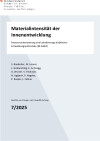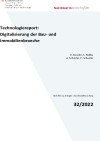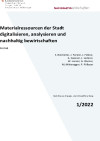Suchergebnisse für "Factsheet: Energietechnologien gestalten, die für alle sinnvoll und nutzbar sind"
Materialintensität der Innenentwicklung - Ressourcenbewertung und Lokalisierung städtischer Entwicklungspotentiale (M-DAB2)

Bei der Bewertung von Innenentwicklungspotenzialen wurde erstmals auch die Materialintensität der Innenentwicklung (anfallende Stoffmengen) für unterschiedliche Entwicklungsvarianten berücksichtigt. Dabei wurde ein Methodenset zur holistischen Bewertung von Potenzialflächen und verschiedene Entwicklungsvarianten und -szenarien zur ressourcenschonenden Innenentwicklung geschaffen.
Schriftenreihe
7/2025
S. Bindreiter, W. Lorenz, L. Grabuschnig, E. A. Dengg, G. Wurzer, V. Pachauer, N. Ugljanin, P. Nageler, P. Rasper, J. Fellner
Herausgeber: BMK
Deutsch, 122 Seiten
Downloads zur Publikation
BIMstocks - Digital Urban Mining Platform for assessing the material composition of building stocks through coupling of BIM to GIS
Hauptziel von BIMstocks ist die Entwicklung einer Methodik für die digitale Erfassung der materiellen Zusammensetzung des Baubestandes für die Modellierung einer digitalen Urban Mining Plattform sowie Prädiktion der Recyclingpotentiale.
TWIN - Digitale Zwillinge für zukunftsfähige Gebäude
Digitale Gebäudezwillinge werden bislang aufgrund eines oft ungünstigen Verhältnisses von Aufwand zu Nutzen kaum in der Praxis eingesetzt. Ziel des Projekts TWIN ist es, Anwendungsfälle digitaler Gebäudezwillinge mit hoher ökologischer und ökonomischer Wirkung zusammenzuführen, um darauf aufbauend Anwendungsszenarien mit großem Umsetzungspotential aufzubereiten.
Kletterpflanzen NAVI – Webapplikation zur verlässlichen Auswahl von Kletterpflanzen
Ziel des Projektes ist die Entwicklung einer digitalen Planungshilfe, in Form einer Webapplikation, zur Auswahl von Kletterpflanzen und passenden Rankhilfen für unterschiedliche Anwendungsfälle.
QualitySysVillab - Sicherung nachhaltiger Qualitäten in Quartiersentwicklungen durch Prozesssteuerung und neue digitale Methoden
Entwicklung eines Prozess-Konzeptes um nachhaltige Qualitäten in der Quartiersentwicklung von der Absichts- und Ankündigungsebene in die gebaute Realität zu bringen. Der Prozessablauf wird durch digitale Methoden der Energie- und Tragwerksplanung unterstützt und im Rahmen einer Case-Study evaluiert.
Beyond - Virtual Reality-fähige Energiedienste für intelligente Energiesysteme
Interdisziplinäres Forschungs- und Entwicklungsprojekt zur Entwicklung von Energiedienstleistungen der nächsten Generation mit dem Zusammenspiel verschiedener Technologien: Virtuelle Realität (VR), maschinelles Lernen, physikalische Simulation und Internet der Dinge (IoT).
CO2-Demobau - Sondierung zur Durchführbarkeit CO2-neutraler Demonstrationsbaustellen
Durch Aufzeigen von grünen Innovationen, Vernetzung mit Stakeholdern der Baubranche und Anwendung der Erkenntnisse der Vorstudie "CO2 neutrale Baustelle" wird das Fundament für zukünftige CO2-neutrale Demonstrationsbaustellen gelegt. Diese Baustellen dienen als Best-Practice-Beispiele für die Bereiche Vergabe, Baubetriebsorganisation und -technologie.
DataScience4SmartQ+ - Potentiale der Quartiersentwicklungsplanung auf dem Weg zum Plus-Energie-Quartier – Teil 2
DataScience4SmartQuarters entwickelt und erforscht eine innovative Methode zur schnellen und effizienten Evaluierung von Simulationsszenarien (Gebäude/Energie, Mobilität) für Gemeinden.
Autology - the automated ontology generator
Ontologien bilden die Basis für die Erfassung, Analyse/Verarbeitung, Verwertung, Dokumentation und Archivierung von Gebäude- und Bauteildaten in allen Phasen des Lebenszyklus. Aktuell ist die semantische Beschreibung und Strukturierung der Daten nur mit großem manuellem Aufwand möglich. Genau an dieser Stelle setzt das Projekt Autology durch die Anwendung Künstlicher Intelligenz an. Übergeordnetes Projektziel ist die automatisierte Gewinnung und Erzeugung von Metadaten zur Erstellung von Ontologien aus dem Gebäudeautomationssystem unter Anwendung innovativer, KI-basierter Ansätze.
Twin2Share - Digitale Zwillinge zur energetischen Optimierung in Energiegemeinschaften (EGs)
Digitale Zwillinge zur Unterstützung von Energiegemeinschaften über ihren Lebenszyklus. Im Fokus stehen die Optimierung von Energieeffizienz und Kosten, dynamisches Lastmanagement und die Einbindung von Nutzer:innen, um nachhaltige Energienutzung und die Stabilisierung des Stromnetzes zu fördern.
Technologiereport: Digitalisierung der Bau- und Immobilienbranche

In der Vielzahl digitaler Möglichkeiten ist es nur sehr schwer möglich, einen Überblick zu behalten, Trends und Potentiale abzuschätzen sowie Zusammenhänge zu erkennen. Der vorliegende Report zielt daher darauf ab, den aktuellen Stand der Technik und die Markteinschätzung vielversprechender digitaler Technologien zu beschreiben. Es werden Informationen über konkrete Anwendungsfälle, Mehrwert und Herausforderungen der jeweiligen Technologien bereitgestellt. Die dargestellten Analysen dienen der Potentialbewertung und der strategischen Weichenstellung zur Integration der aktuell wichtigsten digitalen Technologien der Bau- und Immobilienbranche.
Schriftenreihe
32/2022
K. Künzler, S. Robbi, A. Schuster, P. Schuster
Herausgeber: BMK
Deutsch, 92 Seiten
Downloads zur Publikation
SIMPLE AD Evaluator - S.I.M.P.L.E. Sustainable Integration Modeling and Predictive Leveraging Evaluator
SIMPLE AD Evaluator schließt eine bestehende Lücke in der nachhaltigen Gemeindeplanung, indem er eine niedrigschwellige und kooperative Bewertungsmöglichkeit für frühe Planungsphasen bietet. Durch die Verknüpfung von Fragebögen mit System Dynamics Modellen liefert das Tool fundierte Entscheidungsgrundlagen und maßgeschneiderte Nachhaltigkeits-Checklisten. Damit unterstützt es Gemeinden, Projektentwickler:innen und Entscheidungsträger:innen bei einer strategischen und kosteneffizienten nachhaltigen Transformation von der Idee bis zur Umsetzung.
AI4FM - Artificial Intelligence for Facility Management
KI-basierte Erkennung von Anomalien und Fehlern in TGA-Systemen von Gebäuden. Digitale Zwillinge von Gebäuden mit Simulationsmodellen zum Testen und Optimieren von regelbasierten Fehlererkennungsmethoden. Mining der aufgezeichneten Zeitreihendaten aus bestehenden Gebäudemanagementsystemen, um Machine-Learning-Modelle für die Fehlererkennung zu trainieren.
Materialressourcen der Stadt digitalisieren, analysieren und nachhaltig bewirtschaften (M-DAB)

Im Forschungsvorhaben wurde untersucht, wie uns digitale Technologien unterstützen können die bestehenden und zukünftigen Materialressourcen im Bauwesen qualitativ (Baustoffe und deren Recycling) und quantitativ (Baustoffmengen) festzumachen.
Schriftenreihe
1/2022
S. Bindreiter, J. Forster, J. Fellner, A. Gassner, J. Lederer, W. Lorenz, G. Wurzer, M. Mitteregger, P. Pöllauer
Herausgeber: BMK
Deutsch, 124 Seiten
Downloads zur Publikation
Circular Twin - Ein digitales Ökosystem zur Generierung und Bewertung kreislauffähiger Digitaler Zwillinge
Bis 2030 wird mehr als das Äquivalent von zwei Erden benötigt, um den Bedarf an natürlichen Ressourcen zu decken, ein Übergang zu zirkulären Systemen ist daher essentiell, insbesondere in der Bauindustrie. Das digitale "Circular Twin" Ökosystem ermöglicht die frühzeitige Implementierung der Ziele der Kreislaufwirtschaft als auch der durchgängigen Digitalisierung im Bauwesen mittels Digitalen Zwillingen, Generative Design Algorithmen und Virtual Reality.
digiaktiv - digitale Transformation für größere Interaktivität in der Technische Gebäudeausrüstung-Planung
Das Projekt digiaktiv verfolgte, eine Verbesserung der Interoperabilität zwischen den unterschiedlichen Baugewerbegewerken durch neutrale, offene semantische Datenmodelle zu ermöglichen. Dabei trägt digiaktiv mittels digitaler Transformationsprozesse zur Steigerung der Planungsqualität und dem Betrieb von Bauwerken, sowie zur Minimierung des Schnittstellenrisikos bei.
MaBo - Materialeinsparung bei Bohrpfählen - Ein Beitrag zur Reduktion der CO2-Emissionen im Bauwesen
Entwicklung einer innovativen Methode zur Materialeinsparung bei Bohrpfählen, um somit die CO2-Emissionen im Bauwesen zu reduzieren. Durch die Optimierung der Konstruktionsmethoden und den Einsatz alternativer Materialien soll die Nachhaltigkeit der Gründungskörper verbessert werden.
GreenFDT – Green Facade Digital Twin – Fassadenbegrünung mit digitalem Zwilling
In interdisziplinärem Rahmen werden die Möglichkeiten zur Optimierung des Hinterlüftungsabstandes von Fassadenbegrünungselementen und deren Wirkungspotenziale auf Raum- und Stadtklima untersucht. Die genaue und umfassende Untersuchung dieser Zusammenhänge wird durch den Einsatz umfangreicher Messtechnik, sowie die Entwicklung und Integration eines Digitalen Zwillings in ein BIM-Modell ermöglicht.
BIMSavesEnergy - BIM-basierte Planungsmethoden zur Sicherstellung von Energie-effizienz im Bauprozess
Das Building Information Model (BIM) bewirkt grundlegende Veränderungen in Planung und Bau von Gebäuden, da durch die gemeinsame Datenbasis erstmals eine enge, organisationsübergreifende Zusammenarbeit in Bauprojekten möglich wird. In diesem Projekt wurden BIM-basierte Planungsmethoden entwickelt, die den Einfluss von Planungsentscheidungen auf die Energieeffizienz quantitativ bewertbar und im Managementprozess steuerbar machen.
DiCYCLE - Reconsidering digital deconstruction, reuse and recycle processes using BIM and Blockchain
Analyse und Abbildung von End-of-Life-Prozessen im Bauwesen und deren Optimierung durch Kopplung digitaler Technologien - BIM, Blockchain und Smart Contracts, für eine transparente Erfassung und Nachverfolgung der Wiederverwendung und Wiederverwertung von Baumaterialen und Bauelementen entlang des Lebenszyklus.
